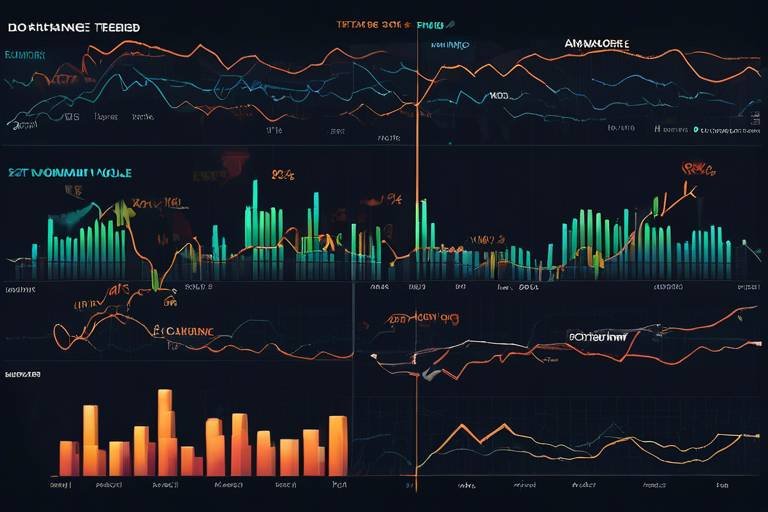The Future of Wallets in the Gig Economy
The gig economy is rapidly transforming the way we think about work, and at the heart of this evolution is the rise of digital wallets. Gone are the days when cash was king; now, digital wallets are becoming the lifeline for gig workers, providing them with a seamless and efficient way to manage their earnings. As we dive deeper into this topic, we’ll explore not just the mechanics of these digital tools but also the broader implications they have for workers and platforms alike. Are digital wallets merely a trend, or are they paving the way for a new financial landscape? Let’s unravel this mystery together.
Digital wallets have exploded in popularity over the last few years, especially among gig workers who crave convenience and efficiency. With the rise of platforms like Uber, TaskRabbit, and Fiverr, the need for quick and reliable payment solutions has never been greater. But what exactly is driving this surge? Several factors contribute to the rise of digital wallets in the gig economy:
- Technological Advancements: The proliferation of smartphones and mobile internet has made it easier than ever for workers to access their funds on the go.
- Consumer Preferences: Today's gig workers prefer instant gratification, and digital wallets cater to this desire by offering immediate access to earnings.
- Globalization: As gig work becomes more global, digital wallets simplify cross-border transactions, allowing workers to receive payments from anywhere in the world.
So, what’s in it for gig workers? The benefits of using digital wallets extend far beyond just receiving payments. They offer a suite of features designed to enhance the work experience. Let’s dive into some of the key advantages:
One of the most compelling features of digital wallets is the ability to receive payments instantly. Imagine finishing a gig and, instead of waiting days for your money to clear, you see the funds appear in your wallet almost immediately. This capability has a profound impact on cash flow for gig workers, allowing them to pay bills, invest in tools, or simply enjoy their hard-earned money without delay. This immediacy can be a game-changer, especially for those living paycheck to paycheck.
Another significant advantage is the reduced transaction fees that digital wallets offer compared to traditional banking methods. Traditional banks often charge hefty fees for wire transfers or check deposits, which can eat into a gig worker's earnings. In contrast, many digital wallets provide lower fees, allowing gig workers to retain more of their hard-earned cash. Consider the following comparison:
| Payment Method | Average Transaction Fee |
|---|---|
| Traditional Bank Transfer | 3-5% |
| Digital Wallet Transfer | 1-2% |
Many digital wallets come with integrated financial tracking tools that help gig workers manage their income and expenses more effectively. These tools can categorize spending, track earnings over time, and even generate reports that make tax season a breeze. Imagine having a personal finance assistant right in your pocket, helping you make informed decisions about your money. With these features, gig workers can gain valuable insights into their financial health, making it easier to plan for the future.
While the benefits are clear, it’s essential to address the security and privacy concerns that come with using digital wallets. With great convenience comes great responsibility. Users must be aware of potential risks, such as data breaches or unauthorized transactions. However, most reputable digital wallets employ advanced security measures, including encryption and two-factor authentication, to protect users. It's crucial for gig workers to stay informed and take proactive steps to safeguard their financial information.
The integration of digital wallets with gig platforms is revolutionizing the payment process. Platforms are increasingly adopting digital wallets to streamline transactions, making it easier for workers to get paid. This shift not only enhances the user experience but also improves the overall efficiency of the gig economy. What does this mean for both workers and platforms? Let’s take a closer look.
Many gig platforms are forming partnerships with digital wallet providers to offer seamless payment solutions. These collaborations can lead to innovative features that benefit both workers and platforms. For instance, platforms may offer exclusive discounts or rewards for using specific wallets, creating a win-win situation. As these partnerships grow, we can expect to see even more tailored solutions that cater to the unique needs of gig workers.
As the gig economy continues to evolve, so too will the payment solutions available to workers. Emerging trends in digital wallets, such as cryptocurrency integration and AI-driven financial insights, are set to reshape the landscape. Imagine being able to receive payments in Bitcoin or having an AI analyze your spending habits to suggest ways to save. The possibilities are endless, and they hold the potential to enhance the gig work experience dramatically.
Q: What are digital wallets?
A: Digital wallets are electronic devices or online services that allow users to store and manage their payment information securely.
Q: How do digital wallets benefit gig workers?
A: They offer instant payments, reduced transaction fees, and integrated financial tracking tools, enhancing the overall work experience.
Q: Are digital wallets secure?
A: While there are security concerns, reputable digital wallets use advanced security measures to protect user information.
Q: What is the future of digital wallets in the gig economy?
A: The future looks promising, with trends like cryptocurrency integration and AI-driven insights set to revolutionize payment solutions.

The Rise of Digital Wallets
In recent years, the world has witnessed a remarkable shift towards digital wallets, especially in the realm of the gig economy. These digital payment solutions have become essential tools for gig workers, offering them a level of convenience and efficiency that traditional banking methods simply cannot match. But what exactly has fueled this meteoric rise? Let's dive into some of the key factors that have contributed to the popularity of digital wallets.
First and foremost, the advent of smartphones has played a pivotal role in the proliferation of digital wallets. As more people around the globe gain access to smartphones and the internet, the ability to manage finances from the palm of one’s hand has become increasingly appealing. This accessibility has made it easier for gig workers, whether they are driving for ride-sharing services, delivering food, or freelancing online, to receive and manage payments on-the-go.
Moreover, the gig economy itself has been a driving force behind the adoption of digital wallets. With the nature of gig work often involving irregular hours and unpredictable income, the need for quick and reliable payment methods has never been more critical. Digital wallets allow gig workers to receive payments instantly, providing them with the cash flow they need to navigate their financial obligations. This immediacy is a game-changer, enabling workers to pay bills, purchase necessities, or even invest in their next gig without delay.
Another significant factor is the increasing number of platforms that support digital wallets. From popular gig platforms like Uber and TaskRabbit to freelance websites like Upwork, many are now integrating digital wallet options into their payment systems. This not only enhances the user experience but also encourages gig workers to adopt these wallets as their primary payment method. In fact, a survey conducted in 2023 revealed that 65% of gig workers prefer using digital wallets over traditional banking methods.
| Year | Percentage of Gig Workers Using Digital Wallets |
|---|---|
| 2019 | 30% |
| 2020 | 45% |
| 2021 | 55% |
| 2022 | 60% |
| 2023 | 65% |
Furthermore, the rise of e-commerce has also contributed to the acceptance of digital wallets. As more consumers turn to online shopping, the demand for seamless and secure payment methods has surged. Digital wallets not only provide this convenience but also enhance security through encryption and tokenization, making transactions safer for both consumers and gig workers alike. This growing trend is reshaping how we think about money and transactions in the modern world.
In addition to convenience and security, the integration of loyalty programs and rewards schemes within digital wallets has made them even more attractive. Many wallets now offer cashback, discounts, or points that can be redeemed for various services, which adds extra value for gig workers. Imagine receiving a small percentage back every time you get paid for a gig—suddenly, those small earnings feel a bit more significant!
In conclusion, the rise of digital wallets in the gig economy is not just a passing trend; it reflects a fundamental change in how we manage and perceive money. As technology continues to advance and the gig economy expands, it’s likely that digital wallets will become even more integral to the financial lives of gig workers. They provide a blend of speed, security, and simplicity that resonates with the needs of today’s workforce.

Benefits for Gig Workers
The gig economy is booming, and with it, the need for efficient payment solutions has never been greater. Digital wallets have emerged as a game-changer for gig workers, offering a plethora of benefits that enhance their work experience. Imagine receiving your hard-earned money instantly, without the hassle of waiting for traditional banking processes to clear. This is just one of the many advantages that digital wallets bring to the table. They are not just a trend; they are revolutionizing how gig workers manage their finances.
One of the standout features of digital wallets is the ability to facilitate instant payments. For gig workers, cash flow is crucial. When you're juggling multiple gigs, waiting days or even weeks to get paid can be a serious setback. With digital wallets, payments can be processed in real-time, allowing workers to access their earnings immediately. This immediacy can mean the difference between being able to pay a bill on time or facing late fees. It's like having a financial lifeline right at your fingertips!
Let's dive deeper into the impact of instant payments. Imagine you just finished a ride-sharing gig, and within seconds, the payment is in your digital wallet. This feature not only enhances your cash flow but also provides a sense of financial security. You can plan your expenses better, knowing that your money is readily available. This immediacy can also reduce the stress associated with waiting for payments, allowing gig workers to focus more on their work rather than their finances.
Another significant benefit of using digital wallets is the reduced transaction fees. Traditional banking methods often come with hefty fees that can eat into a gig worker's earnings. Digital wallets, on the other hand, typically offer lower transaction costs. This means more money in the pocket for the workers who put in the effort. For instance, if a gig worker earns $100 and faces a 3% transaction fee with a traditional bank, they would only take home $97. With a digital wallet that charges only 1%, they would retain $99. That’s an extra $2 that could go towards groceries or a night out!
In addition to instant payments and lower fees, many digital wallets come equipped with integrated financial tracking tools. These tools help gig workers keep tabs on their income and expenses, making it easier to budget and save. Imagine having a personal finance assistant that categorizes your spending, shows you where your money is going, and helps you set savings goals. This feature can be particularly beneficial for gig workers who often have fluctuating incomes. Knowing how much you’ve earned and where your money is going can empower you to make informed financial decisions.
Moreover, these financial tools can often generate reports that are helpful during tax season. As gig workers, managing taxes can be daunting, but having a clear view of your earnings and expenses simplifies the process immensely. You can easily track deductions and prepare for tax payments, making the whole experience much less stressful.
While digital wallets offer a smorgasbord of benefits, it’s essential to remain vigilant about security and privacy. With great power comes great responsibility, and users must take steps to protect their financial information. However, the advantages they provide, from instant payments and reduced fees to advanced financial tracking, make digital wallets an invaluable asset for gig workers navigating the fast-paced world of the gig economy.
- What are digital wallets? Digital wallets are electronic applications that allow users to store and manage their payment information securely, facilitating quick transactions.
- How do digital wallets benefit gig workers? They provide instant payments, lower transaction fees, and integrated financial tracking tools, enhancing cash flow and financial management.
- Are digital wallets secure? While they offer convenience, users must take precautions to protect their information, such as using strong passwords and enabling two-factor authentication.
- Can digital wallets be used for all types of gigs? Yes, most digital wallets are versatile and can be used across various gig platforms, including ride-sharing, freelancing, and delivery services.

Instant Payments
One of the primary advantages of digital wallets is the ability to receive payments instantly. Imagine finishing a gig and, instead of waiting days for your earnings to hit your bank account, you can access your money within seconds. This instant payment feature is a game changer for gig workers, allowing them to manage their finances more effectively. In the fast-paced world of gig work, where every minute counts, having immediate access to funds can make all the difference.
Think about it: when you're juggling multiple gigs, bills, and personal expenses, the last thing you need is to wait for your payment to clear. Instant payments mean that you can cover unexpected expenses or reinvest in your tools and resources without delay. For example, if you’re a rideshare driver and need to fill your tank, a quick transfer from your digital wallet allows you to refuel and get back on the road in no time.
Additionally, this feature significantly enhances cash flow management. Gig workers often face unpredictable income streams, making it crucial to have funds available when needed. With instant payments, workers can maintain a more stable financial footing. They can also take advantage of opportunities as they arise, whether that means accepting last-minute gigs or making essential purchases.
To put this into perspective, consider the following table that compares traditional payment methods with digital wallets:
| Payment Method | Processing Time | Transaction Fees |
|---|---|---|
| Traditional Bank Transfer | 1-3 Business Days | Varies (often higher) |
| Digital Wallet | Instant | Lower (often free) |
As seen in the table, the stark contrast in processing times and fees between traditional banking methods and digital wallets highlights why many gig workers are making the switch. With lower transaction fees and the ability to access funds immediately, digital wallets are becoming the preferred choice for those navigating the gig economy.
In conclusion, the instant payment feature of digital wallets is not just a convenience; it's a necessity for gig workers who thrive on flexibility and speed. By enabling immediate access to earnings, digital wallets empower workers to take control of their financial lives, making it easier to seize opportunities and manage day-to-day expenses. As we move forward, the importance of this feature will only continue to grow in the ever-evolving landscape of the gig economy.
- What are digital wallets? Digital wallets are online services that allow users to store, send, and receive money electronically.
- How do instant payments work? Instant payments allow users to receive funds immediately after a transaction, typically through a digital wallet.
- Are there fees associated with using digital wallets? Many digital wallets offer low or no transaction fees, making them cost-effective compared to traditional banking methods.
- How secure are digital wallets? Digital wallets use encryption and other security measures to protect user information, but it’s essential to follow best practices for online security.
- Can I use a digital wallet for all types of transactions? While digital wallets are increasingly accepted, some businesses may still prefer traditional payment methods.

Reduced Transaction Fees
One of the most appealing aspects of digital wallets for gig workers is the when compared to traditional banking methods. Let’s face it: every penny counts when you’re hustling to make a living. Traditional payment methods, like bank transfers or checks, often come with hefty fees that can eat into your earnings. With digital wallets, these fees are often significantly lower, allowing gig workers to keep more of what they earn.
Consider this: if you’re a rideshare driver or a freelance graphic designer, every time you receive a payment, a portion of it might be deducted as a transaction fee. This can be frustrating, especially when you’ve put in hard work and long hours. Digital wallets, on the other hand, typically charge a flat fee or a small percentage of the transaction, which can lead to substantial savings over time.
To illustrate the potential savings, let’s take a closer look at a comparison of transaction fees:
| Payment Method | Average Transaction Fee | Example Scenario (for $100 payment) |
|---|---|---|
| Traditional Bank Transfer | 3-5% | $3 - $5 |
| Check Payment | Variable (up to $10) | $10 |
| Digital Wallet | 1-2% | $1 - $2 |
As you can see, the difference can be quite significant. By utilizing a digital wallet, gig workers can save anywhere from $1 to $5 on each transaction, depending on the payment method they would otherwise use. Over a month of consistent work, these savings can really add up, providing gig workers with more financial freedom.
Moreover, the transparency of digital wallets can also be a game-changer. Many wallets display the transaction fees upfront, so there are no hidden surprises when you receive your earnings. This level of clarity helps gig workers plan their finances better and make informed decisions about their payment methods.
In a world where every dollar matters, the reduced transaction fees associated with digital wallets not only enhance the overall earning potential for gig workers but also contribute to a more sustainable financial future. As the gig economy continues to grow, embracing these modern payment solutions can lead to a significant improvement in how workers manage their finances.
- What is a digital wallet? A digital wallet is an electronic device or online service that allows individuals to make electronic transactions, store payment information, and manage their finances.
- How do digital wallets reduce transaction fees? Digital wallets typically charge lower fees than traditional banking methods, allowing users to save money on each transaction.
- Are digital wallets safe to use? Yes, most digital wallets use advanced encryption and security measures to protect users' information and transactions.
- Can I use a digital wallet for all types of payments? While many digital wallets are versatile, it’s essential to check if the specific wallet you choose supports the payment methods you need.

Financial Tracking Tools
In today’s fast-paced gig economy, managing finances can feel like trying to juggle flaming torches while riding a unicycle. It’s not just about earning money; it’s about keeping track of it, budgeting, and planning for the future. This is where integrated into digital wallets come into play, providing gig workers with a much-needed lifeline. These tools are designed to simplify the often chaotic financial landscape that gig workers navigate daily.
Imagine having a personal accountant right in your pocket. That’s essentially what financial tracking tools offer. With features that allow users to categorize expenses, monitor income streams, and even set savings goals, these tools transform the way gig workers approach their finances. For instance, when a delivery driver completes several jobs in a day, instead of manually noting down each payment and expense, they can simply check their digital wallet app, which automatically logs and categorizes every transaction. This not only saves time but also reduces the likelihood of errors that can occur when tracking finances manually.
Moreover, many digital wallets come equipped with real-time analytics. This means gig workers can see their earnings and spending habits at a glance, making it easier to identify trends. Are you spending too much on fuel? Are certain gigs more profitable than others? With visual reports and graphs, these insights can empower workers to make informed decisions about where to focus their efforts. For example, a rideshare driver might discover that driving during peak hours leads to significantly higher earnings, prompting them to adjust their schedule accordingly.
Additionally, budgeting features can help gig workers set aside money for taxes, savings, or unexpected expenses. Many financial tracking tools allow users to create budgets based on their income and expenses, which can be a game-changer for those who often face variable earnings. By allocating funds for taxes, workers can avoid the last-minute scramble when tax season rolls around. It’s like having a financial GPS that guides you through the twists and turns of your gig income, ensuring you're always on the right path.
To illustrate the impact of these tools, let’s take a look at a simple comparison of two gig workers: one who uses a digital wallet with integrated financial tracking tools and one who doesn’t.
| Feature | Worker A (With Tracking Tools) | Worker B (Without Tracking Tools) |
|---|---|---|
| Income Tracking | Automated, categorized, and visualized | Manual entry, prone to errors |
| Expense Management | Real-time updates and categorization | Requires manual tracking and receipts |
| Budgeting | Custom budgets set for taxes and savings | No structured budgeting |
| Financial Insights | Visual reports and trends | Limited to personal intuition |
The difference is striking. Worker A benefits from a clear understanding of their finances, leading to better decisions and potentially higher earnings. Meanwhile, Worker B may find themselves overwhelmed and unprepared for financial obligations. In the gig economy, where every penny counts, having robust financial tracking tools is not just a luxury; it’s a necessity.
In conclusion, as digital wallets continue to evolve, the integration of financial tracking tools will undoubtedly enhance the gig work experience. These tools provide gig workers with the clarity and control over their finances that is essential for success. With the right tools at their disposal, gig workers can not only survive but thrive in this dynamic economy.

Security and Privacy Concerns
As digital wallets become increasingly popular in the gig economy, are at the forefront of discussions among gig workers and platform operators alike. With the convenience of receiving payments instantly, there comes a weighty responsibility to safeguard personal and financial information. Imagine carrying all your cash in a single wallet, but instead of being a physical object, it's a digital representation of your finances. Just like you'd want to keep that wallet safe from pickpockets, it's crucial to protect your digital wallet from cyber threats.
One of the most pressing issues is the risk of data breaches. Cybercriminals are constantly on the lookout for vulnerabilities in digital payment systems. When a breach occurs, sensitive information such as credit card numbers, bank details, and personal identification can be compromised, leading to potential financial losses and identity theft. To mitigate these risks, many digital wallet providers are implementing advanced security measures, including encryption and two-factor authentication. However, it's essential for users to remain vigilant and adopt best practices for their own safety.
Another concern revolves around privacy. As gig workers use digital wallets, they often have to share their personal information with various platforms and service providers. This raises questions about how that data is stored, who has access to it, and how it is used. For instance, some platforms may track spending habits or transaction data, which could be used for targeted advertising or even sold to third parties. To protect their privacy, users should carefully read the terms and conditions of their digital wallet providers and understand how their data is being handled.
Here are some practical tips to enhance your security and privacy when using digital wallets:
- Use strong, unique passwords: Avoid using easily guessable passwords and consider using a password manager to keep track of them.
- Enable two-factor authentication: This adds an extra layer of security by requiring a second form of verification.
- Regularly monitor your transactions: Keep an eye on your account activity to spot any unauthorized transactions quickly.
- Be cautious with public Wi-Fi: Avoid accessing your digital wallet on unsecured networks to prevent potential hacking attempts.
In conclusion, while digital wallets offer a plethora of conveniences to gig workers, it is vital to remain aware of the security and privacy challenges they present. By taking proactive steps and staying informed, users can enjoy the benefits of digital wallets while minimizing their risks.

Integration with Gig Platforms
The integration of digital wallets with gig platforms is not just a trend; it's a transformative shift that is reshaping the way gig workers receive payments and manage their finances. Imagine a world where your earnings are deposited directly into your digital wallet within seconds of completing a task. No more waiting days for traditional bank transfers or dealing with checks that can take forever to clear. This is the reality that digital wallets bring to gig workers, and it's a game changer.
As gig platforms recognize the need for speed and efficiency in payment processing, many are adopting digital wallet solutions to streamline transactions. This integration is not merely about convenience; it enhances the overall user experience for both gig workers and clients. By offering a seamless payment method, platforms can attract more users, thereby increasing their market share. Think of it as a win-win situation: gig workers get paid faster, and platforms can boast a more robust and appealing service.
Moreover, partnerships between gig platforms and digital wallet providers are becoming increasingly common. These collaborations are designed to create a more cohesive ecosystem, where financial transactions are smooth and hassle-free. For instance, platforms like Uber and Lyft have already integrated digital wallets, allowing drivers to cash out their earnings instantly. This not only boosts driver satisfaction but also encourages more drivers to join the platform, knowing they can access their earnings immediately.
In addition to speed, the integration of digital wallets also brings enhanced security features. Many digital wallets employ advanced encryption and security protocols, which help protect the sensitive financial information of gig workers. This is crucial, especially in an era where data breaches and cyber threats are rampant. By using a digital wallet, gig workers can feel more secure about their transactions, knowing that their financial data is safeguarded.
As we look towards the future, the integration of digital wallets with gig platforms is likely to expand even further. New technologies, such as blockchain and artificial intelligence, may play a role in enhancing the functionality of digital wallets, making them even more appealing to gig workers. Imagine being able to track your earnings in real-time or receiving personalized financial advice based on your spending habits—all through your digital wallet. The possibilities are endless!
In conclusion, the integration of digital wallets with gig platforms is revolutionizing the gig economy. It offers faster payments, improved security, and a better overall experience for gig workers. As this trend continues to grow, we can expect to see even more innovative solutions that cater to the unique needs of gig workers, making their financial lives easier and more efficient.

Partnerships with Wallet Providers
In the rapidly evolving landscape of the gig economy, partnerships between gig platforms and digital wallet providers are becoming increasingly common. These collaborations are not just a passing trend; they represent a fundamental shift in how payments are processed and how gig workers are compensated. By integrating digital wallets, gig platforms can offer a more streamlined and efficient payment process, which is crucial in a world where time is money. Imagine a scenario where a driver completes a ride and receives their earnings instantly, without the usual waiting period associated with traditional banking methods. This is not just a dream; it’s becoming a reality thanks to these partnerships.
One of the most significant implications of these partnerships is the ability to enhance user experience. For gig workers, this means less friction in the payment process and more control over their finances. With digital wallets, workers can manage their earnings in real-time, allowing for better financial planning and immediate access to funds. This immediacy can be a game-changer for those who rely on gig work as their primary source of income. Many gig platforms are recognizing this need and are actively seeking partnerships that will allow them to provide these services.
Furthermore, these collaborations can lead to innovative features that benefit both workers and platforms. For instance, some digital wallets are beginning to offer features like expense tracking, budgeting tools, and even investment options. When gig platforms partner with wallet providers that offer these features, they are not only enhancing the payment experience but also providing additional value to their workers. This can help attract and retain top talent in a competitive gig economy.
However, it’s important to note that not all partnerships are created equal. The success of these collaborations often depends on the alignment of goals between the gig platforms and wallet providers. For example, if a gig platform prioritizes speed and efficiency but partners with a wallet provider that has a reputation for slow processing times, the partnership may not yield the desired results. Therefore, it’s crucial for both parties to ensure that their objectives align to create a seamless experience for gig workers.
To illustrate the impact of these partnerships, let’s take a look at a few examples:
| Gig Platform | Wallet Provider | Key Benefits |
|---|---|---|
| Uber | PayPal | Instant cash outs, reduced fees |
| DoorDash | Cash App | Real-time earnings tracking |
| Fiverr | Wise | Lower international transfer fees |
These examples highlight how partnerships can enhance the overall experience for gig workers, making it easier for them to access their funds and manage their earnings. As the gig economy continues to grow, we can expect to see more of these partnerships emerging, leading to even more innovative payment solutions.
In conclusion, the partnerships between gig platforms and digital wallet providers are paving the way for a more efficient and user-friendly payment landscape. As these collaborations evolve, they will undoubtedly play a crucial role in shaping the future of gig work, making it more accessible and financially rewarding for workers. The question remains: how will these partnerships continue to adapt to the changing needs of the gig economy?
- What are digital wallets? Digital wallets are electronic devices or online services that allow individuals to make electronic transactions, store payment information, and manage finances securely.
- How do partnerships between gig platforms and wallet providers benefit workers? These partnerships provide gig workers with instant access to their earnings, lower transaction fees, and additional financial management tools.
- Are digital wallets safe to use? Yes, when used correctly, digital wallets can offer a high level of security, including encryption and two-factor authentication.
- What trends can we expect in the future regarding digital wallets in the gig economy? We can anticipate more integrated features, enhanced security measures, and wider adoption across various gig platforms as the demand for efficient payment solutions continues to grow.

Future Trends in Payment Solutions
The landscape of payment solutions is evolving rapidly, especially in the context of the gig economy. As technology continues to advance at breakneck speed, we can expect to see several key trends shaping the future of digital wallets and payment systems. One of the most exciting developments is the integration of artificial intelligence (AI) into payment solutions. AI can enhance user experience by offering personalized financial insights, predicting spending patterns, and even suggesting optimal times for transactions. Imagine a digital wallet that not only stores your money but also acts as a financial advisor, helping you make smarter decisions with your earnings!
Another trend to keep an eye on is the rise of cryptocurrency payments. With the growing acceptance of cryptocurrencies, many gig platforms are starting to explore how digital wallets can facilitate transactions in Bitcoin, Ethereum, and other digital currencies. This shift could provide gig workers with more flexibility in how they receive and spend their earnings. However, it also raises questions about volatility and regulatory compliance that need to be addressed.
Moreover, the demand for contactless payments is skyrocketing. As consumers increasingly prefer quick and seamless transactions, gig platforms are likely to adopt technologies such as Near Field Communication (NFC) to enable contactless payments. This not only speeds up the payment process but also enhances the overall user experience. Picture this: a food delivery gig worker simply taps their phone to complete a transaction, eliminating the need for cash or card swipes.
In addition to these innovations, we can expect to see a stronger emphasis on security and privacy. As digital wallets become more ubiquitous, the need for robust security measures will intensify. This could lead to the implementation of advanced biometric authentication methods, such as facial recognition or fingerprint scanning, making it safer for gig workers to manage their finances on-the-go. Furthermore, transparent data usage policies will become a priority, ensuring that users feel confident about how their information is handled.
Lastly, the concept of financial inclusivity will gain momentum. Digital wallets can bridge the gap for gig workers who may not have access to traditional banking services. By providing an easy-to-use platform for managing payments, these wallets can empower individuals who might otherwise be excluded from the financial system. This trend aligns with the broader goal of creating a more inclusive economy, where everyone has the opportunity to thrive.
In conclusion, the future of payment solutions in the gig economy is bright and full of potential. With advancements in AI, cryptocurrency, contactless payments, enhanced security, and financial inclusivity, gig workers will likely experience a more streamlined and rewarding payment process. As we move forward, it’s essential for both gig workers and platforms to stay informed about these trends to maximize their benefits in this ever-evolving landscape.
- What are digital wallets?
Digital wallets are electronic devices or online services that allow individuals to make electronic transactions. They store payment information securely and enable users to pay for goods and services through their smartphones or computers.
- How do digital wallets benefit gig workers?
Digital wallets provide gig workers with instant payments, reduced transaction fees, and integrated financial management tools, making it easier to manage their earnings and expenses.
- Are digital wallets secure?
While digital wallets offer convenience, security can be a concern. However, many wallets implement advanced security measures, such as encryption and biometric authentication, to protect user information.
- Will cryptocurrency become a common payment method for gig workers?
As the acceptance of cryptocurrencies grows, it is likely that more gig platforms will adopt them as a payment method. However, this will depend on regulatory developments and market stability.
Frequently Asked Questions
- What are digital wallets and how do they work in the gig economy?
Digital wallets are online applications or services that allow users to store, send, and receive money electronically. In the gig economy, they facilitate quick and secure transactions between gig workers and clients, enabling instant payments and reducing the hassle of cash transactions.
- What benefits do digital wallets offer to gig workers?
Digital wallets provide several advantages for gig workers, including instant payments, reduced transaction fees, and integrated financial tracking tools. These features help gig workers manage their finances more efficiently, ensuring they get paid promptly and can track their earnings and expenses easily.
- How do instant payments impact gig workers?
Instant payments significantly improve cash flow for gig workers, allowing them to access their earnings immediately after completing a job. This can be crucial for managing day-to-day expenses and financial stability, especially for those relying on gig work as their primary income source.
- Are there any security concerns with using digital wallets?
Yes, while digital wallets offer convenience, they also come with security and privacy risks. Users should be aware of potential threats such as hacking and phishing. It's essential to use strong passwords, enable two-factor authentication, and keep software updated to protect personal information.
- How are gig platforms integrating digital wallets?
Many gig platforms are increasingly partnering with digital wallet providers to streamline their payment processes. This integration simplifies transactions for both workers and clients, making it easier to manage payments and enhancing the overall user experience.
- What future trends can we expect in digital wallet technology?
As the gig economy continues to grow, we can expect digital wallets to evolve with more advanced features like enhanced security measures, improved user interfaces, and better integration with various financial services. These trends will likely make digital wallets an even more essential tool for gig workers.



















